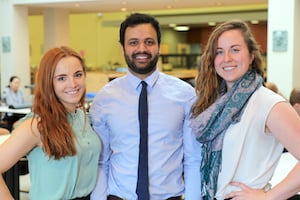 |
|
|
(from left) Brittany Berk, Arnav Chandra and Laurel Banach are cofounders and leaders of the new School of Medicine Peer Mentoring Program. |
A new mentoring program launched by School of Medicine students pairs third- and fourth-year students with their less experienced first- and second-year counterparts to help navigate the rigorous path to becoming a doctor.
“We wanted a peer mentoring program to incorporate academic and career support for our junior students,” said Brittany Berk, SOM ’19, who spearheaded the initiative. “We also felt we had the unique opportunity in which we could help students prepare for UMass Medical School-specific challenges, like the coursework they would be going through that we just went through.”
Laurel Banach, SOM ’19, said the program was launched last fall to support first- and second-year students as they transition through different phases of their medical education.
“Mentoring is mainly active listening,” said Banach, one of the founders of the program. “Our role is to identify what mentees’ short and long-term goals while in medical school and career goals beyond are, and their approaches to accomplish them. If they’re totally astray, we try to help direct them into what a realistic goal might be and how to facilitate that.”
Berk, Banach and fellow SOM ’19 students Stephanie Bond and Sana Majid designed and conducted surveys and focus groups with UMMS students, delved into the literature and came up with a plan, before launching the program. When they recruited students as peer mentors through a formal application and interview process, they heard from 60 applicants for 50 slots.
Mentoring between fellow students is different from that between students and faculty, or subordinates and superiors, in which there can be an imbalance of experience, seniority and authority. While those relationships are also invaluable, peer mentoring offers a unique opportunity for students to help each other through the rigors of medical training.
“We thought it was important for every student to have someone who they would feel comfortable talking about what difficulties they might be having,” said Berk.
Mentors attend required training workshops developed by the group for topics such as mentoring in action and mentoring for the National Board of Medical Examiners’ comprehensive basic science exam. Workshops are presented by peer mentoring student leaders and faculty. Berk also sends a weekly newsletter to mentors with useful information and ideas to discuss with their mentees.
“The primary commitment for mentors is to participate in the workshops and develop skills. We talk about what guiding principles make mentoring different from teaching, coaching or advising,” said Banach.
While the program founders are graduating in June, they will continue it by supporting next year’s program leaders.
Co-presidents Danielle Kerrigan and Abraham Lin, and chairs Arnav Chandra, Lauren Cournoyer and Pietro Miozzo, all SOM ’20, will develop additional workshops such as difficult mentoring scenarios and mentoring students with diverse backgrounds. They also plan to create a faculty mentor panel for students like themselves who are interested in mentoring as a future career focus.
“The peer mentoring program adds a lot to our supportive learning environment,” said Michael Ennis, MD, professor of family medicine & community health. “The peer mentors impart user-friendly advice that is often different in its focus than what a learning communities faculty mentor would address.” Dr. Ennis and David Hatem, MD, professor of medicine, co-direct the Learning Communities and have participated in the peer mentor workshops.